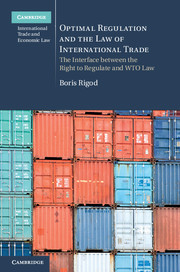Description
Optimal Regulation and the Law of International Trade
The Interface between the Right to Regulate and WTO Law
Cambridge International Trade and Economic Law Series
Author: Rigod Boris
This book applies a law and economics methodology to enquire into the interface between regulation and international trade law.
Language: English
Subject for Optimal Regulation and the Law of International Trade:
Approximative price 107.92 €
In Print (Delivery period: 14 days).
Add to cart
Publication date: 11-2015
322 p. · 15.2x22.9 cm · Hardback
322 p. · 15.2x22.9 cm · Hardback
Description
/li>Contents
/li>Biography
/li>
Are the limitations imposed on World Trade Organization (WTO) members' right to regulate efficient? This is a question that is only scarcely, if ever, analysed in existing literature. Boris Rigod aims to provide an answer to this fundamental concern. Using the tools of economic analysis and in particular the concept of economic efficiency as a benchmark, the author states that domestic regulatory measures should only be subject to scrutiny by WTO bodies when they cause negative international externalities through terms of trade manipulations. He then suggests that WTO law, applied by the WTO judiciary can prevent WTO members from attaining optimal levels of regulation. By applying a law and economics methodology, Rigod provides an innovative solution to the problem of how to reconcile members' regulatory autonomy and WTO rules as well as offering a novel analytical framework for assessing domestic regulations in the light of WTO law.
Foreword Petros C. Mavroidis; Introduction; Law and economics in a nutshell; Part I. Optimal Regulation and International Trade Law - Theory: 1. Introduction to Part I; 2. Optimal regulation; 3. Deviations from optimal regulation; 4. Deviations from optimal regulation and the role of international trade agreements; 5. Conclusion to Part I; Part II. Optimal Regulation and International Trade Law - Application: 6. Introduction to Part II; 7. Domestic regulation and the GATT; 8. Domestic regulation and the TBT Agreement; 9. Domestic regulation and the SPS; 10. Conclusion to Part II.
Boris Rigod practises international trade and competition law at Freshfields Bruckhaus Deringer. He was a Fulbright-Schuman Scholar at Stanford Law School and NYU School of Law and has published in leading journals on international trade law.
© 2024 LAVOISIER S.A.S.




